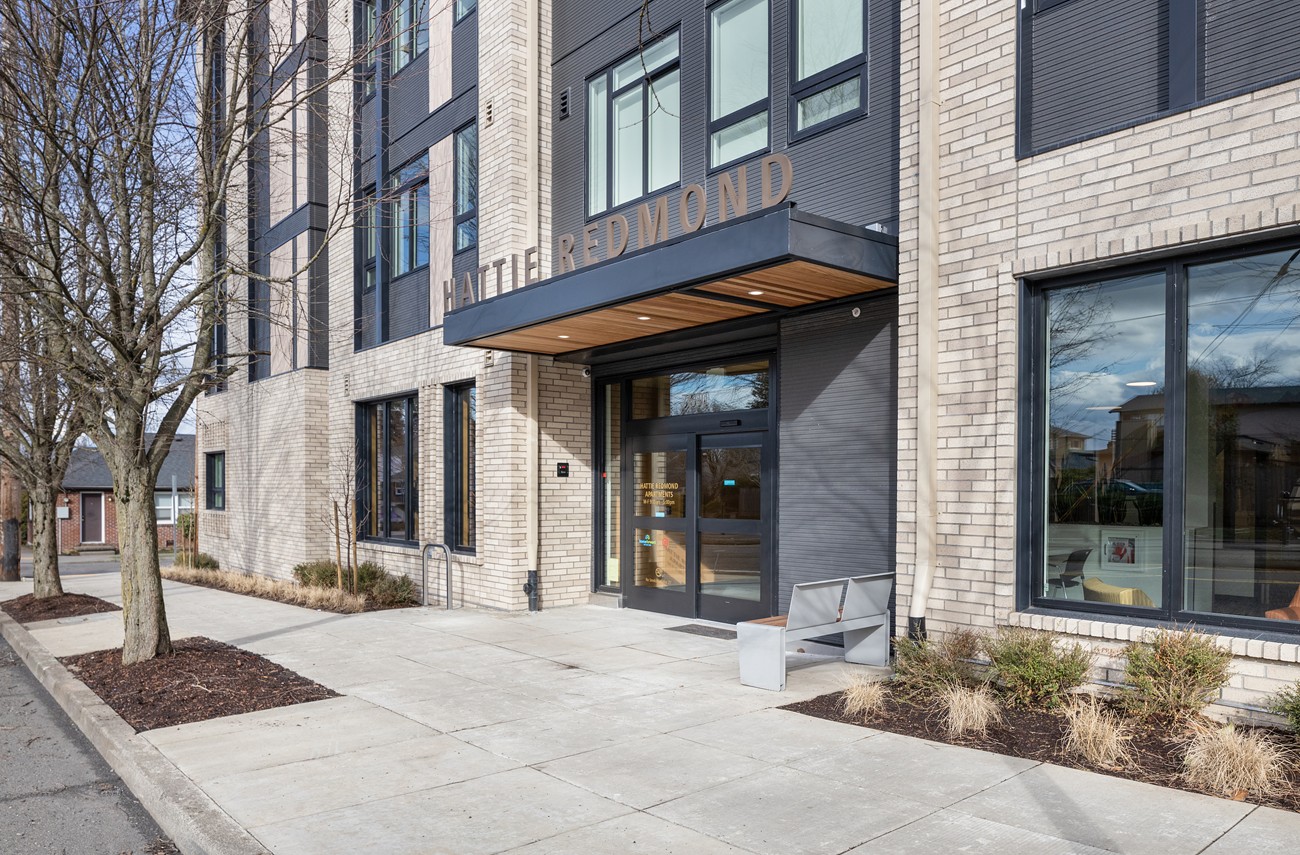In north Portland’s newest affordable apartment building, a painted portrait of Hattie Redmond graces the foyer.
Redmond was hailed as a prominent suffragist and civil rights leader in Oregon during the 1880s and early 1910s, when the state’s racist housing policies and segregation laws excluded her from many spaces. Now, the 60-unit affordable apartment complex on North Interstate Avenue bears not just her portrait, but her name.
Leaders with Home Forward and the Urban League of Portland unveiled the Hattie Redmond apartments to the public Tuesday, April 4, lauding the project as a beacon of what’s possible amid the state’s housing crisis.
The complex, co-developed by the Urban League, Home Forward and Portland Housing Bureau, is the first housing development project Urban League has undertaken. The four-story building in a historically Black neighborhood features 60 micro studios with full kitchens and bathrooms, meant to house people who are disabled and transitioning out of homelessness. Units feature hardwood floors with sleek, matching cabinetry. Framed art and decorative murals adorn the hallways of the complex.

The Hattie offers supportive services and permanent housing for people with extremely limited incomes. It was built on the site of an existing complex, formerly the Baldwin apartments, for about $25.4 million, with a portion of the funds coming from Metro’s 2018 Affordable Housing bond and Oregon Housing and Community Services. That’s less than the $27 million the city of Portland plans to spend to carry out a proposed mass encampment plan on three sites around the city.
Nkenge Harmon Johnson, president and CEO of the Urban League of Portland, didn’t mince words when lauding the organization’s commitment to doing what elected leaders wouldn’t.
She said the vision was the result of “irritation.”
“The powers that be had made yet another silly decision to invest in the wrong thing. Maybe it was another tent city, maybe some other temporary housing, but they were things that were not going to help in the long run and they certainly weren’t going to house any Black people temporarily, (or) long term,” Harmon Johnson recalled. “This Urban League, this team … made a decision that we were going to do what was necessary to save people’s lives. We were also not going to take the excuse from the powers that be about why they simply couldn’t do it.”

Home Forward will manage the property, with Urban League of Portland providing support services for at least the next 10 years. Urban League will also have first rights to purchase the building when its 15-year tax credit funding period ends.
Harmon Johnson and Home Forward CEO Ivory Mathews called the project “a matter of will and resources” and pressed elected leaders to look to the Hattie as a model for housing solutions.
“This building will provide safe shelter to 60 formerly homeless people in need of culturally specific supportive services,” Mathews said. “From the location to services offered to building amenities, Urban League of Portland thought of everything. This gives us hope that many more people who have been homeless can—and will—thrive with the right support.”
Mathews called Redmond, the building’s namesake, “a fierce advocate for community, who spent her entire life building community with Black Portlanders.”
“Despite racist laws that prohibited Black people from residing in Oregon, Black families built lives in the Albina neighborhood,” Mathews said. “Black churches and social clubs served as refuge from a city and state that was unwelcoming to its people. Now, 150 years later, we stand here today to honor and continue Hattie’s legacy.”
Impact NW, a homeless outreach and services nonprofit, reported African American adults are one of the three fastest growing homeless populations in Portland. BIPOC residents now represent 39 percent of the city’s homeless population, according to the organization.
Charise Norwood is one of the first 25 residents at the Hattie.
“There’s a peer support here,” Norwood said, sharing her experience in a pre-recorded video. “What’s needed is more communities like this. It’s incredible. To be a part of this is a privilege and gratitude is most important.”
The project has also garnered support from state lawmakers.
Congressman Earl Blumenauer, who represents Oregon’s 3rd Congressional District, donned a signature neon-colored bike pin on his jacket lapel, while recalling how Black veterans returning from WWII often couldn’t get bank loans, even if they had the financial means to buy houses. He praised the project as “a symbol for how we’re going to redress those past wrongs.”
“We pay so much for the cost of failure,” Blumenauer said. “The Hattie Redmond is a symbol of the cost of success.”
Prospective tenants will be screened for eligibility through Multnomah County’s Coordinated Access program. Those who want to apply for a studio at the Hattie should get connected with a case worker by calling 211 or visiting 211info.org



















